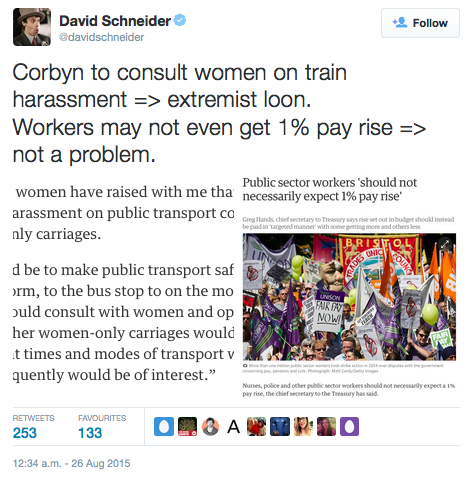The rise of Jeremy Corbyn, Bernie Sanders, Syriza, Podemos, Occupy movements, etc. indicates the emergence of 21st century socialism. These parties and movements are a reaction to the crisis of capitalism and exploding inequalities that affect a large number of people. 21st century socialism is the search for an alternative to the politics and culture of possessive individualism and neo-liberal capitalism. Social democracy is likely to undergo significant changes in the next twenty years.
The disbelief that a new type of socialism had arrived resulted in a smear-campaign against Jeremy Corbyn. The Daily Mail for example published a fictive story about how Prime Minster Corbyn ruled for “1,000 days that destroyed Britain”. The anti-Corbyn campaign has not been limited to right-wing media. For example, the left-liberal Guardian spoke in an editorial of an “existential danger for Labour” under Corbyn’s leadership, welcomed Labour MP’s vote of no confidence against Corbyn and said that the “Corbyn experiment is effectively over at Westminster”. A study of journalistic representations of Corbyn found that in 89% of 812 analysed news stories, Corbyn’s views were absent, distorted or challenged. 43% of all stories ridiculed or personally attacked Corbyn. The study concludes that “the degree of viciousness and antagonism with which the majority of the British newspapers have treated Corbyn is deemed to be highly problematic from a democratic perspective”.
Political communication not only takes place via newspapers and broadcasting, but increasingly also on social media. Both Corbyn’s supporters and opponents have taken to social media. The new study “Red Scare 2.0: User-Generated Ideology in the Age of Jeremy Corbyn and Social Media” analysed how Jeremy Corbyn was portrayed on Twitter. It analysed 32,298 tweets mentioning Jeremy Corbyn that were collected during a three-week period before the 2015 Labour leadership election.
The study documents the emergence of user-generated anti-socialist ideology. Ideologies are semiotic structures that justify domination. Twitter limits linguistic expression to 140 characters. User-generated ideology such as online redbaiting therefore has to compress ideology. User-generated ideology is the use of digital media for producing and spreading semiotic structures that justify domination by distorting reality, misrepresenting it, or inventing false representations of reality. By making claims, insults and personal attacks without underlying arguments and justifications, users compress ideology on Twitter into 140 characters.
Given the high-speed and brevity of tweets, user-generated ideology avoids debate and arguments. It instead focuses on personal attacks, threats, and claims without proof. Typical examples were tweets that described Corbyn as “a wet handwringing leftie terrorist”, “left wing loony lefty extreme radical Corbyn”, “dangerous Communist”, “bloody pinko”, “socialist pig”, or “communist fraud”.
The mainstream media’s anti-Corbyn discourses informed users’ opposition to Corbyn on Twitter. This became evident in two ways: First, the analysed tweets often linked to articles in the Daily Mail, the Daily Telegraph, the Daily Express, the Sun and the Times. Second, mainstream news discourses were reproduced by users online. These discourses included the claims that Corbyn wanted to create a command economy, loved Britain’s enemies, and has a “loony-left” hippie-culture, lifestyle and personality. The ideal-type anti-socialist tweet said either that “Jeremy Corbyn is a radical, Marxist, socialist, communist, militant, revolutionary left-wing extremist whose politics are outdated and old-fashioned” or concluded that “Jeremy Corbyn will destroy Britain and the Labour Party and must be stopped”. User-generated ideology is not independent from, but highly interlinked with mainstream media’s power structures.
The analysis also showed the existence of a form of automated online politics using Twitter bots. A bot is an algorithm that carries out activities online based on programmed instructions. For example web crawlers are bots that identify new websites that are then indexed by platforms such as Google. A Twitter bot scans the Twittersphere for certain keywords and then automatically re-tweets or responds to particular postings. In the conducted analysis, the two profiles posting the largest number of anti-Corbyn tweets were two bots. They are programmed in such a way that they try to name and shame socialists on Twitter by responding to socialist tweets in a negative manner.
Anti-socialist bots show a tendency of the algorithmisation of politics and ideology in the age of big data. Political bots generate attention and visibility by referencing political events and responding to popular postings in an automated manner. The effect is that online politics tends to become standardised, instrumental, reified, thing-like, machine-driven, and de-humanised. It becomes increasingly difficult to distinguish automated from human communication and politics.
Ideologies are often irrational and emotional. They are difficult to challenge by direct responses. On social media, Corbyn-supporters have fought back against anti-socialist ideology. The study shows that directly responding to irrational trolling and online hate speech is of limited use. Corbyn supporters instead communicated positive messages about Corbyn, linked to Corbyn’ actual ideas, used satire, sarcasm, cynicism and humour and smart memes, or dialectically reversed attacks. Whereas user-generated ideology aims at what the critical theorist Herbert Marcuse called one-dimensional reason, dialectical online communication and postings advance what he terms “two-dimensional, dialectical modes of thought”.
Christian Fuchs’ study “Red Scare 2.0: User-Generated Ideology in the Age of Jeremy Corbyn and Social Media” was published in the Journal of Language and Politics.
Image (Corbyn): By YouTube/exadverso [CC BY 3.0 (http://creativecommons.org/licenses/by/3.0)], via Wikimedia Commons
Photo by Sara Kurfeß on Unsplash













